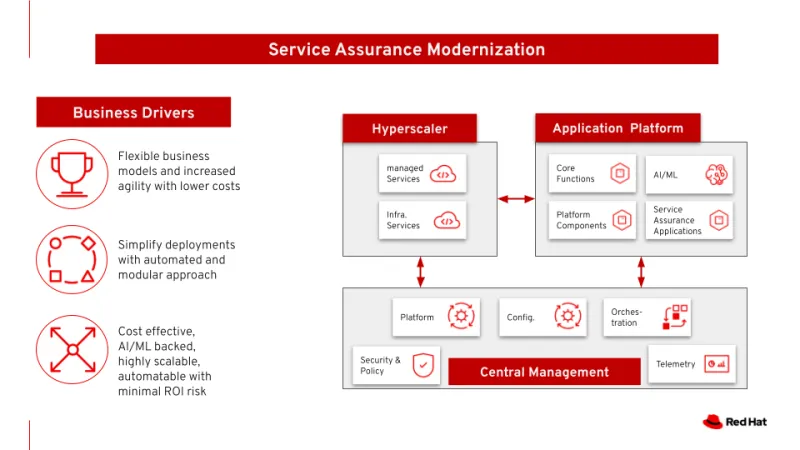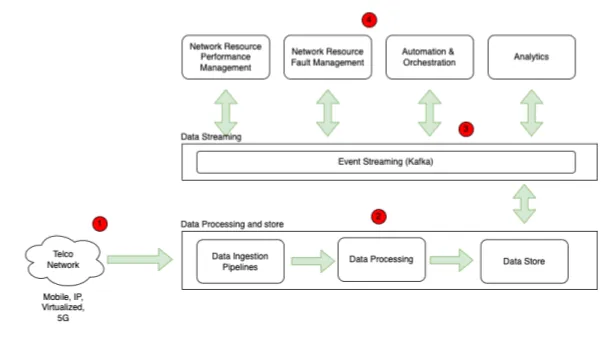Service assurance is a key part of an Operational Support System (OSS) as it can help deliver end-to-end service management—from service activation and provisioning, to service performance monitoring and customer support. Service assurance aims to provide customers with the level of service they expect from their communication service provider per their customer service level agreement (SLA).
By monitoring, identifying, predicting and resolving any technical issues that may impact the quality of service, communication service providers are able to provide reliable and high quality network services by minimizing downtime and service disruptions. This includes proactively detecting and resolving network problems to ensure network availability and performance, in addition to monitoring and resolving any customer issues through automated actions.
What are Operations Support Systems?
OSSs are the information processing systems that manage communications networks. These systems allow an organization to coordinate subscribers, services, resources, processes and activities. They assist service providers in designing, building, operating and maintaining communications networks.
For more information on OSS/BSS (Business Support System) in the public cloud, check out our previous blog.
OSS service assurance includes the following activities:
- Fault and performance management: Detection, isolation, resolution of network faults, and enabling providers to optimize network performance to meet SLA goals
- Capacity management: Planning and management of network capacity to meet dynamically-changing service demand
- Configuration management: Appropriate configuration of network elements to support service requirements and security
Figure 1 (below) provides an overview of the OSS service assurance solution.
This solution:
- Provides a cloud-native OSS architecture with on-demand scaling where and when needed, with high performance data streaming and processing
- Provides network automation, network fault management and network analytics and assurance based on a fully-managed application platform on the public cloud
- Provides a fundamental unified data streaming and processing layer that can be used as an engine for other OSS or BSS services

Figure 1: OSS service assurance solution
Benefits of cloud-based OSS Service Assurance solutions
By using public clouds, communication service providers can reduce cost and increase agility—resulting in a faster time to market.
The proposed portfolio architecture uses automation, managed services and software-as-a-service (SaaS) to overcome complexity and provide SLA support.
This portfolio architecture is still under development and undergoing detailed validation efforts.
Logical solution view
Conceptually, the service assurance solution stack can be broadly categorized into several components:
- Cloud Infrastructure Services: Provide necessary compute, network and storage resources on the public cloud
- Application Platform components: Accommodate software infrastructure and applications with declarative desired state, consistency and facilities for scaling, healing, observing and monitoring of the workloads
- Application Platform Services components: Provide data processing, management, streaming and storage for the applications
- Main and Supplementary functions: provide network operations logic (OSS), analytics and automation, based on data collected and processed from the network, stored at the application infrastructure layer. In addition, provide user management, configuration and application logging and monitoring
- Management and Orchestration: provide security, multicluster management and automation across multiple availability zones/regions.
Check out the proposed solution blueprint at Red Hat Portfolio Architecture.

Figure 2: Conceptual view of Service Assurance solution architecture in cloud
OSS Service assurance in action
The various components of the solution stack need to work together to deliver end-to-end service management capabilities. Figure 3 shows an example of the various components working together.

Figure 3: OSS Service Assurance solution in action
(1) Events, metrics and log data (mostly in batch) streaming from the customer network in a private secure connection.
(2) High-performance data ingestion and parallel processing.
(3) High-performance event streaming by Apache Kafka.
(4) AI-backed applications enabling flexibility towards new data streams, predictive and reactive automated network management and analytics.
Conclusion
Service assurance is critical for communication service providers to deliver end-to-end service management and helps provide customers with the level of service they expect per their customer service level agreement (SLA).
Using a fully-managed cloud native application platform on a private and/or public cloud, communication service providers can reduce time to market, time to value, streamline Day 1 and Day 2 operations, and increase overall agility.
This article outlined a portfolio architecture that uses automation, managed services and software-as-a-service (SaaS) to overcome complexity of taking a service assurance solution to the cloud.
Check out the Red Hat Portfolio Architecture Center for examples of successful customer deployments of Red Hat and partner open source software.
À propos des auteurs
Aviv Guetta, based in Israel, is a Chief Technologist in Red Hat’s Global Telco sector. He has extensive experience in the IT and telco industries, including strategy work, business planning, cross-functional team building and architecture efforts supporting open source development and management. His expertise in telco cloud computing and its ecosystem extends to customers and partners, particularly within hardware and software architectures and open source topics, extending Red Hat’s cultural philosophy, which facilitates collaboration among team members and innovation for our customers.
Ishu Verma is Technical Evangelist at Red Hat focused on emerging technologies like edge computing, IoT and AI/ML. He and fellow open source hackers work on building solutions with next-gen open source technologies. Before joining Red Hat in 2015, Verma worked at Intel on IoT Gateways and building end-to-end IoT solutions with partners. He has been a speaker and panelist at IoT World Congress, DevConf, Embedded Linux Forum, Red Hat Summit and other on-site and virtual forums. He lives in the valley of sun, Arizona.
Plus de résultats similaires
AI insights with actionable automation accelerate the journey to autonomous networks
IT automation with agentic AI: Introducing the MCP server for Red Hat Ansible Automation Platform
Technically Speaking | Taming AI agents with observability
Transforming Your Identity Management | Code Comments
Parcourir par canal
Automatisation
Les dernières nouveautés en matière d'automatisation informatique pour les technologies, les équipes et les environnements
Intelligence artificielle
Actualité sur les plateformes qui permettent aux clients d'exécuter des charges de travail d'IA sur tout type d'environnement
Cloud hybride ouvert
Découvrez comment créer un avenir flexible grâce au cloud hybride
Sécurité
Les dernières actualités sur la façon dont nous réduisons les risques dans tous les environnements et technologies
Edge computing
Actualité sur les plateformes qui simplifient les opérations en périphérie
Infrastructure
Les dernières nouveautés sur la plateforme Linux d'entreprise leader au monde
Applications
À l’intérieur de nos solutions aux défis d’application les plus difficiles
Virtualisation
L'avenir de la virtualisation d'entreprise pour vos charges de travail sur site ou sur le cloud

